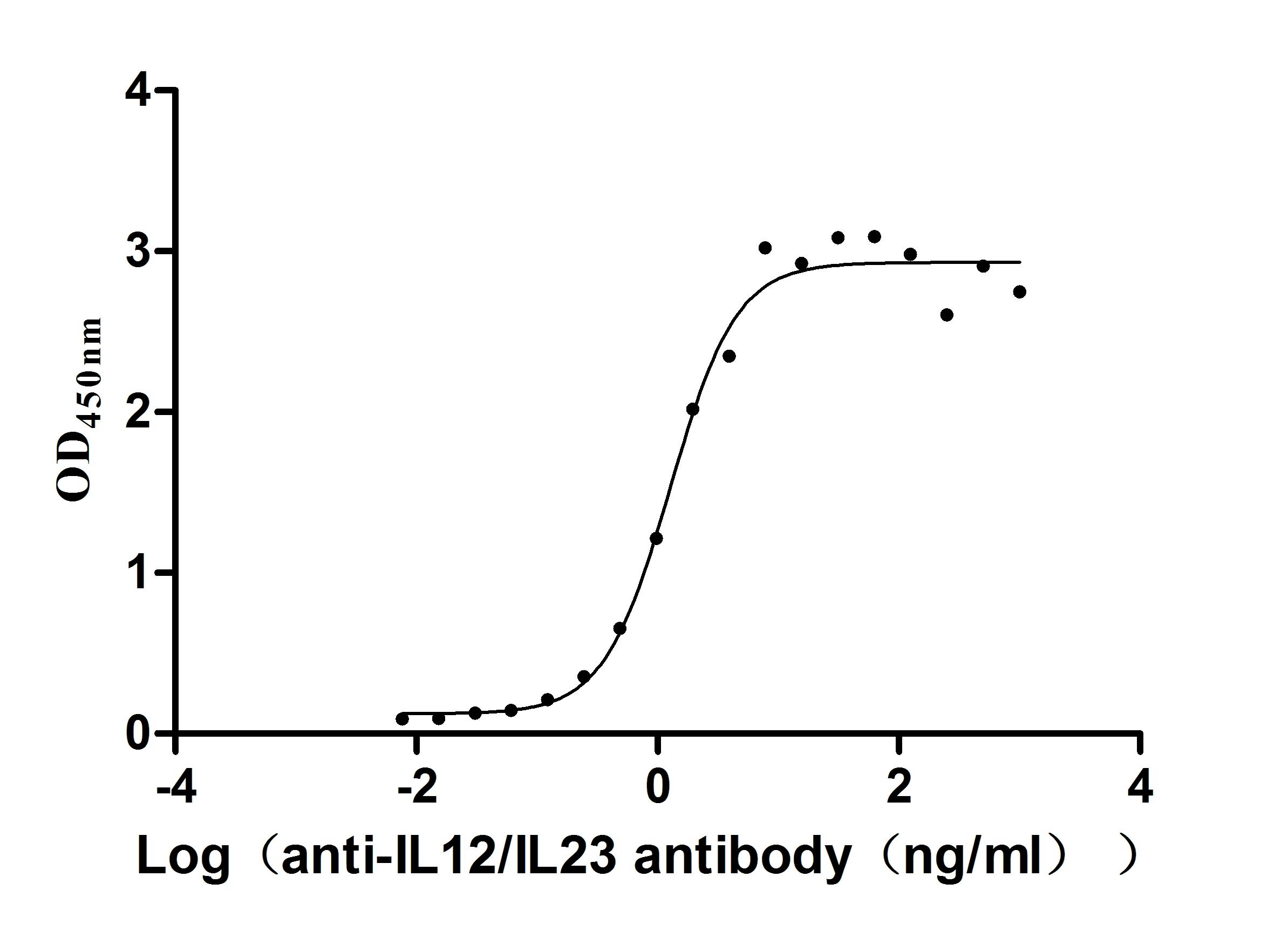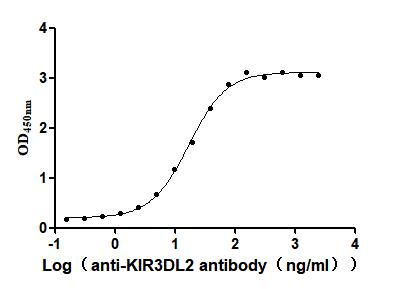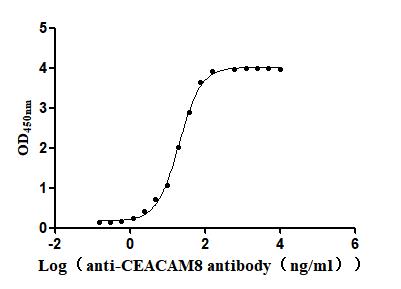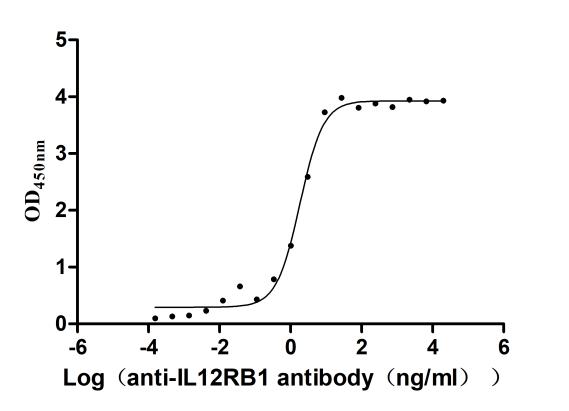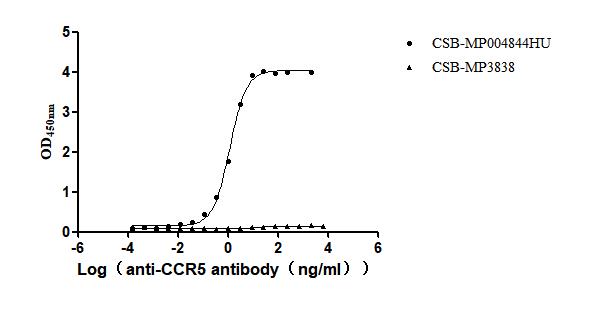Recombinant Mouse Platelet-derived growth factor receptor alpha (Pdgfra), partial
-
中文名称:小鼠Pdgfra重组蛋白
-
货号:CSB-YP017712MO
-
规格:
-
来源:Yeast
-
其他:
-
中文名称:小鼠Pdgfra重组蛋白
-
货号:CSB-EP017712MO
-
规格:
-
来源:E.coli
-
其他:
-
中文名称:小鼠Pdgfra重组蛋白
-
货号:CSB-EP017712MO-B
-
规格:
-
来源:E.coli
-
共轭:Avi-tag Biotinylated
E. coli biotin ligase (BirA) is highly specific in covalently attaching biotin to the 15 amino acid AviTag peptide. This recombinant protein was biotinylated in vivo by AviTag-BirA technology, which method is BriA catalyzes amide linkage between the biotin and the specific lysine of the AviTag.
-
其他:
-
中文名称:小鼠Pdgfra重组蛋白
-
货号:CSB-BP017712MO
-
规格:
-
来源:Baculovirus
-
其他:
-
中文名称:小鼠Pdgfra重组蛋白
-
货号:CSB-MP017712MO
-
规格:
-
来源:Mammalian cell
-
其他:
产品详情
-
纯度:>85% (SDS-PAGE)
-
基因名:
-
Uniprot No.:
-
别名:Pdgfra; Platelet-derived growth factor receptor alpha; PDGF-R-alpha; PDGFR-alpha; EC 2.7.10.1; Alpha platelet-derived growth factor receptor; Alpha-type platelet-derived growth factor receptor; CD140 antigen-like family member A; Platelet-derived growth factor alpha receptor; CD antigen CD140a
-
种属:Mus musculus (Mouse)
-
蛋白长度:Partial
-
蛋白标签:Tag type will be determined during the manufacturing process.
The tag type will be determined during production process. If you have specified tag type, please tell us and we will develop the specified tag preferentially. -
产品提供形式:Lyophilized powder
Note: We will preferentially ship the format that we have in stock, however, if you have any special requirement for the format, please remark your requirement when placing the order, we will prepare according to your demand. -
复溶:We recommend that this vial be briefly centrifuged prior to opening to bring the contents to the bottom. Please reconstitute protein in deionized sterile water to a concentration of 0.1-1.0 mg/mL.We recommend to add 5-50% of glycerol (final concentration) and aliquot for long-term storage at -20℃/-80℃. Our default final concentration of glycerol is 50%. Customers could use it as reference.
-
储存条件:Store at -20°C/-80°C upon receipt, aliquoting is necessary for mutiple use. Avoid repeated freeze-thaw cycles.
-
保质期:The shelf life is related to many factors, storage state, buffer ingredients, storage temperature and the stability of the protein itself.
Generally, the shelf life of liquid form is 6 months at -20°C/-80°C. The shelf life of lyophilized form is 12 months at -20°C/-80°C. -
货期:Delivery time may differ from different purchasing way or location, please kindly consult your local distributors for specific delivery time.Note: All of our proteins are default shipped with normal blue ice packs, if you request to ship with dry ice, please communicate with us in advance and extra fees will be charged.
-
注意事项:Repeated freezing and thawing is not recommended. Store working aliquots at 4°C for up to one week.
-
Datasheet :Please contact us to get it.
相关产品
靶点详情
-
功能:Tyrosine-protein kinase that acts as a cell-surface receptor for PDGFA, PDGFB and PDGFC and plays an essential role in the regulation of embryonic development, cell proliferation, survival and chemotaxis. Depending on the context, promotes or inhibits cell proliferation and cell migration. Plays an important role in the differentiation of bone marrow-derived mesenchymal stem cells. Required for normal skeleton development and cephalic closure during embryonic development. Required for normal development of the mucosa lining the gastrointestinal tract, and for recruitment of mesenchymal cells and normal development of intestinal villi. Plays a role in cell migration and chemotaxis in wound healing. Plays a role in platelet activation, secretion of agonists from platelet granules, and in thrombin-induced platelet aggregation. Binding of its cognate ligands - homodimeric PDGFA, homodimeric PDGFB, heterodimers formed by PDGFA and PDGFB or homodimeric PDGFC -leads to the activation of several signaling cascades; the response depends on the nature of the bound ligand and is modulated by the formation of heterodimers between PDGFRA and PDGFRB. Phosphorylates PIK3R1, PLCG1, and PTPN11. Activation of PLCG1 leads to the production of the cellular signaling molecules diacylglycerol and inositol 1,4,5-trisphosphate, mobilization of cytosolic Ca(2+) and the activation of protein kinase C. Phosphorylates PIK3R1, the regulatory subunit of phosphatidylinositol 3-kinase, and thereby mediates activation of the AKT1 signaling pathway. Mediates activation of HRAS and of the MAP kinases MAPK1/ERK2 and/or MAPK3/ERK1. Promotes activation of STAT family members STAT1, STAT3 and STAT5A and/or STAT5B. Receptor signaling is down-regulated by protein phosphatases that dephosphorylate the receptor and its down-stream effectors, and by rapid internalization of the activated receptor.
-
基因功能参考文献:
- PDGFRalpha enrichment in hepatic stellate cell-derived extracellular vesicles drives liver fibrosis by a SHP2-dependent mechanism PMID: 29360139
- PDGFR activity is evenly distributed at different membrane microdomains, while integrin-mediated signaling events have inhibitory effects on the activation of PDGFR specifically located in lipid rafts but not outside rafts. PMID: 28487538
- downregulate growth signals provided by PDGFRalpha to initiate oligodendrocyte differentiation and myelination PMID: 30057274
- PDGFRA is not essential for the derivation and maintenance of extraembryonic endoderm stem (XEN) cell lines . PMID: 28919262
- loss of Pdgfra in endothelial-derived mesenchyme in the outflow tract endocardial cushions leads to a secondary defect in neural crest migration during development. PMID: 28714851
- Investigated the developmental process of mesenchymal stem cells (MSCs) in embryos using the gene Pdgfra as a marker. We traced cells expressing Pdgfra and other genes (brachyury, Sox1 and Pmx1) in various mutant embryos until the adult stage. Embryonic MSCs emerge in waves and almost all adult bone marrow MSCs and white adipose tissue MSCs originate from mesoderm and embryonic Pdgfralpha-positive cells. PMID: 29378823
- PDGFRalpha/PDGFRbeta signaling balance determines progenitor commitment to beige (PDGFRalpha) or white (PDGFRbeta) adipogenesis. PMID: 29158445
- our data establish that aberrant stromal PDGFRalpha signaling disrupts extracellular matrix homeostasis during mammary gland development, resulting in increased mammary stiffness and increased potential for tumor growth. PMID: 28501760
- Spreading of PDGFR-alpha-deficient lung fibroblasts was insensitive to increased rigidity, and their migration was not reduced by Rac1-guanine exchange factor (GEF)-inhibition. PDGFR-alpha-expressing fibroblasts migrated toward stiffer regions within two-dimensional substrates by increasing migrational persistence (durotaxis). PMID: 28775097
- Histone H3.3K27M and Trp53 loss and PDGFRA overexpression accelerates disease onset and increases tumor invasion. PMID: 29107533
- PDGFRalpha(+) cells represent the in vitro counterpart of in vivo PrE precursors, and their selection from cultured mESCs yields pure PrE precursors. PMID: 28089671
- The diabetes-induced increase in PDGFRalpha+ cells may be mediated by FOXO3 up-regulation via the inhibition of the PI3K/Akt signaling pathway in STZ-induced diabetic mice. PMID: 28848093
- Constitutive activation of PDGFRalpha leads to expansion of cartilage underlying the coronal sutures, which contribute to suture closure through endochondral ossification, in a process regulated in part by PI3K/AKT signaling. PMID: 28947535
- OLIG2 modulates growth factor signaling in two distinct populations of glioma stem cells, characterized by expression of either the epidermal growth factor receptor (EGFR) or platelet-derived growth factor receptor alpha. PMID: 27626655
- Conditional knockout of Pdgfra in Pdgfra-expressing tissues in mouse embryos at different embryonic days (E9.5 and E10.5) resulted in multiple developmental anomalies of the frontonasal region, the cranium and the abdominal wall musculature. Furthermore, the day at which the Pdgfra is deleted influences the repertoire of the anomalies of the conditional knockout embryos. PMID: 28934221
- By analyzing mice with juxtamembrane or kinase domain point mutations that increase PDGFRalpha activity (V561D or D842V), it was found that PDGFRalpha activation inhibits embryonic white adipose tissue organogenesis in a tissue-autonomous manner. PMID: 28049691
- the spatial location, mRNA expression and Immunophenotyping of PDGFRalpha(+) fibroblasts during sacculation and alveolarization, is reported. PMID: 28408205
- FOXA3 is a marker of the Sertoli cell lineage and of the adult Leydig cell population, and is a regulator of Pdgfra transcription in Leydig cells. PMID: 28379539
- in addition to representing a white adipose tisseu (WAT) adipogenic niche, different PDGFRalpha(+) cell subsets modulate obesity-induced WAT fibrogenesis and are associated with loss of metabolic fitness. PMID: 28215843
- PDGFRalpha and PDGFRbeta are coexpressed in the craniofacial mesenchyme of mid-gestation mouse embryos and that ablation of Pdgfrb in the neural crest lineage results in increased nasal septum width, delayed palatal shelf development, and subepidermal blebbing. PMID: 27856617
- The results from this study indicate that PDGF signaling is required for fiber hypertrophy, extracellular matrix production, and angiogenesis that occur during muscle growth. PMID: 28129672
- polyadenylation of a PDGFRalpha intron in resident stem cells attenuates muscle fibrosis PMID: 27894125
- transient middle cerebral-arterial occlusion (MCAO) was introduced into the mice with conditional Pdgfrb-gene inactivation, including N-PRbeta-KO mice where the Pdgfrb-gene was mostly inactivated in the brain except that in vascular pericytes PMID: 26435273
- PDGFRalpha may be a relevant target to regulate connective tissue remodeling. PMID: 26639755
- demonstrated that PDGFRalpha signaling promotes alveolar septation by regulating fibroblast activation and matrix fibroblast differentiation, whereas myofibroblast differentiation was largely PDGFRalpha independent PMID: 26414960
- PDGFR alpha has an important role in cranial neural crest cell mitosis within the mandibular processes PMID: 26250625
- PDGF signalling in the dermis and in dermal condensates is dispensable for hair follicle induction and formation. PMID: 25708924
- PDGFRalpha has a role in demarcating the cardiogenic clonogenic Sca1+ stem/progenitor cell in adult murine myocardium PMID: 25980517
- The present study provides new insights into the time-dependent commitment of the PDGFRalpha(+) cell lineage to lipofibroblasts and myofibroblasts during late lung development PMID: 26320158
- Ganglioside GD3 enhances invasiveness of gliomas by forming a complex with PDGFRalpha and Yes Kinase. PMID: 25940087
- PDGFRalpha targets progenitor cell plasticity as a profibrotic mechanism. PMID: 26019175
- PDGFR is a key contributor to pulmonary vascular remodeling in experimental pulmonary hypertension. PMID: 25745058
- Multipotential Neural precursors deficient in arylsulfatase A show a higher ratio of long versus short fatty acid sulfatides, reduction in PDGFRa, decreased AKT phosphorylation, and increased exosomal shedding of PDGFRa. PMID: 25605750
- Pdgfralpha expression is important in the fibrotic response to liver injury PMID: 24667490
- Identification of a PEDF signaling mechanism involving PPARG induction, suppression of Wnt/beta-catenin signaling and down-regulation of the PDGFRA/B. PMID: 24763086
- SHP2 is required for cell transformation and ERK activation by mutant PDGF receptors. PMID: 24618081
- The responses of colonic muscle PDGFRalpha(+) cells and smooth muscle cells to purines suggest that SMCs are unlikely targets for purinergic neurotransmission in colonic muscles. PMID: 25055825
- Canonical Wnt-, Hh-, and Fgfr1/Fgfr2-signalling are dispensable for epicardial development, but Pdgfra-signalling is crucial for the differentiation of cardiac fibroblasts from epicardium-derived cells. PMID: 24000064
- PDGFRalpha and IGF-1R are dynamically regulated and distributed in nucleus and cytoplasm in alveolar Rhabdomyosarcoma. PMID: 23928059
- The HDAC11 transcript is a PDGF target; the HDAC11 mRNA abundance correlates inversely with proliferative status. PMID: 24047695
- Temporal activation of PDGFRalpha in liver development is important in hepatic morphogenesis. PMID: 23529017
- We thus establish PDGFRalpha as a novel regulator of MNP development and elucidate the roles of its downstream signaling pathways at cellular and molecular levels. PMID: 24086166
- PDGFRalpha signaling in the primary cilium regulates NHE1-dependent fibroblast migration via coordinated differential activity of MEK1/2-ERK1/2-p90RSK and AKT signaling pathways. PMID: 23264740
- the expression of PDGFRalpha and CD51 among bone marrow stromal cells characterizes a large fraction of Nestin cells, containing most fibroblastic CFUs, mesenspheres, and self-renewal capacity after transplantation PMID: 23776077
- PDGFRalpha+ mesoderm is functionally significant in vascular development and hematopoiesis from phenotype analysis of genetically modified embryos. PMID: 23335233
- These results suggest that an adaptive Src-Pdgfra-Raf-Mapk axis is relevant to PDGFRA inhibition in rhabdomyosarcoma. PMID: 22960170
- PDGFR-alpha expression changes dramatically following lung volume reduction and a subpopulation of PDGF-alpha expressing fibroblasts differentiate into myofibroblasts. PMID: 22652199
- Phf14 acts as a negative regulator of PDGFRalpha expression in mesenchymal cells undergoing normal and abnormal proliferation, and is a potential target for new treatments of lung fibrosis. PMID: 22730381
- Platelet-derived growth factor receptor-alpha(+) cells had a spindle shape or stellate morphology and often possessed multiple processes that contacted one another forming a loose network PMID: 22151424
- These findings demonstrate that transcriptional repression of PDGF-R-alpha after fibroblast injury involves paracrine activity of endogenous TNF-alpha, the formation of a c-Fos-YY1 complex, and negative regulatory activity by HDAC. PMID: 22322974
显示更多
收起更多
-
亚细胞定位:Cell membrane; Single-pass type I membrane protein. Cell projection, cilium. Golgi apparatus.
-
蛋白家族:Protein kinase superfamily, Tyr protein kinase family, CSF-1/PDGF receptor subfamily
-
组织特异性:Focally expressed in cortical interstitial cells and highly expressed in the interstitium of the papillary region. Also expressed by adventitial cells in arterial vessels. Up-regulated in areas of renal fibrosis. In mice with unilateral ureteral obstructi
-
数据库链接:
KEGG: mmu:18595
STRING: 10090.ENSMUSP00000000476
UniGene: Mm.221403
Most popular with customers
-
Recombinant Human C-X-C chemokine receptor type 4 (CXCR4)-VLPs (Active)
Express system: Mammalian cell
Species: Homo sapiens (Human)
-
Recombinant Human Zymogen granule protein 16 homolog B (ZG16B) (Active)
Express system: Mammalian cell
Species: Homo sapiens (Human)
-
Recombinant Human IL12B&IL12A Heterodimer Protein (Active)
Express system: Mammalian cell
Species: Homo sapiens (Human)
-
Recombinant Human Interleukin-2 (IL2) (Active)
Express system: Mammalian cell
Species: Homo sapiens (Human)
-
Recombinant Human Killer cell immunoglobulin-like receptor 3DL2 (KIR3DL2), partial (Active)
Express system: Mammalian cell
Species: Homo sapiens (Human)
-
Recombinant Human Carcinoembryonic antigen-related cell adhesion molecule 8(CEACAM8) (Active)
Express system: Mammalian cell
Species: Homo sapiens (Human)
-
Recombinant Human Interleukin-12 receptor subunit beta-1(IL12RB1),partial (Active)
Express system: Mammalian cell
Species: Homo sapiens (Human)
-
Recombinant Human C-C chemokine receptor type 5 (CCR5)-VLPs (Active)
Express system: Mammalian cell
Species: Homo sapiens (Human)


-AC1.jpg)

